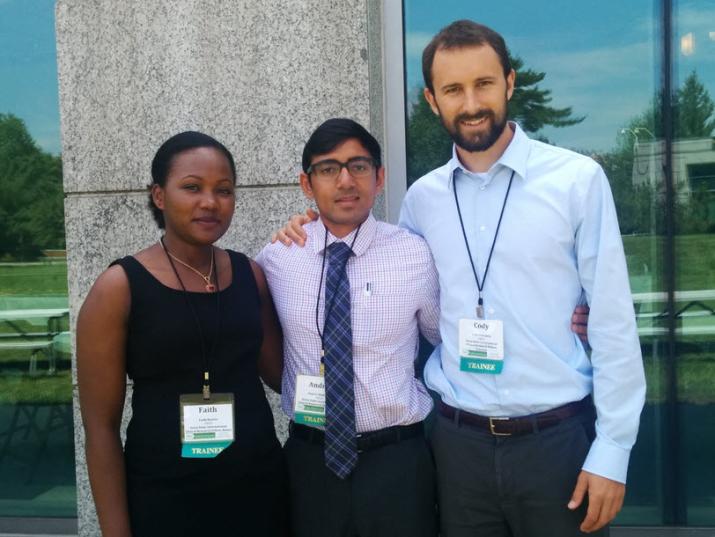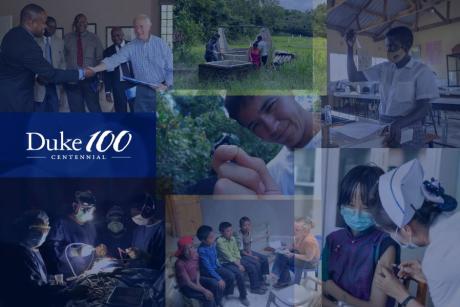
This year's Doris Duke Fellows (l to r) Faith Rialem, Andres Mallipudi and Cody Cichowitz.
Published August 2, 2016 under Education News
The Duke Global Health Institute (DGHI) has selected three new Doris Duke International Clinical Research Fellows for the 2016-17 academic year. The fellows—one medical student from Duke University and two from Johns Hopkins University—will conduct clinical global health research throughout the upcoming academic year.
The fellows will be mentored by Duke and DGHI faculty members as well as staff and faculty at partner universities, NGOs and community-based organizations associated with the research project.
ABOUT THE FELLOWSHIP
Duke University is one of six institutions that offers the fellowships, which are sponsored by the Doris Duke Charitable Foundation. With a long-term goal of developing the next generation of clinical investigators working in global health, the program aims to give medical students an outstanding global health clinical research experience.
Hussain Lalani, one of DGHI’s 2015-16 Doris Duke fellows, said the fellowship fostered significant personal and professional growth for him. “Over the course of the year, I experienced the complex nature of conducting clinical research in a resource-limited setting and developed valuable field research skills that will stay with me for years to come,” he said. “In working closely with dedicated mentors and local collaborators, I gained insight into the process of improving the status quo.”
FELLOWS HEADED TO KENYA, PERU AND TANZANIA
Faith Rialem
Faith Rialem, a Duke University medical student, will be working with Duke professor of medicine Peter Kussin in Eldoret, Kenya, researching knowledge and perceptions regarding palliative care among pastoral leaders in Uasin Gishu. The study will be done in collaboration with Moi Teaching and Referral Hospital and Moi University School of Medicine, one of DGHI’s priority partners.
“I’m excited to learn more about palliative care in Kenya and how it’s viewed by patients as well as clinicians,” said Rialem. “I look forward to a year of learning, networking and personal growth in my career as a future clinician and global health researcher.”
Rialem earned a bachelor’s degree in health science with a minor in chemistry from Hofstra University in 2013. As an undergraduate, Rialem worked as an emergency medicine research intern at North Shore University Hospital and volunteered with American Red Cross Youth Services. She also spent the summer of 2012 as a global health policy intern at Management Sciences for Health. Last summer, Rialem traveled to Eldoret, Kenya, for a month to study sepsis management at the Moi Teaching and Referral Hospital.
Andres Mallipudi
Andres Mallipudi, who attends the Johns Hopkins University School of Medicine, will be working with DGHI assistant professor William Pan in Puerto Maldonado, Peru. He will be investigating the effect of environmental changes on dietary habits and subsequent exposure to mercury in households near Peru's Interoceanic Highway with a focus on maternal-child health outcomes.
“I’m excited about returning to Peru and helping to develop an understanding of the environmental effects on human health,” said Mallipudi, who graduated with a bachelor’s degree in molecular biology from the Brigham Young University (BYU) in 2012.
Mallipudi has had a diverse range of work experiences. During college, Mallipudu participated in a 12- week mentorship in orthopedic surgery and interned with the United States Senate. Mallipudi worked as a molecular biology teaching assistant at BYU and tutor for the Anchorage school district. Currently, he’s working with faculty from Johns Hopkins School of Medicine to investigate differences in rates of parent-to-child non-prescription antibiotic administration between Baltimore Latino and non-Latino populations.
Cody Cichowitz
Cody Cichowitz, another Johns Hopkins University School of Medicine student, will be working in Moshi, Tanzania with DGHI assistant professor Melissa Watt to understand Option B+ and the delivery of HIV care to pregnant and post-partum women. His study will use implementation science to identify factors at both the facility and patient levels that support or obstruct women’s engagement in HIV care and to support the successful implementation of Option B+ in the Kilimanjaro Region of Tanzania.
“I’m excited to spend a year in Tanzania building a better understanding of how clinical research can be used to address global health disparity,” Cichowitz said, “and learning more about how critical moments in life, like pregnancy, impact the course of HIV and other chronic diseases.”
Cichowitz graduated from the University of Colorado with a bachelor’s degree in applied mathematics in 2011. As an undergraduate, he developed a mathematical model to identify contaminant flow in water distribution systems. He has worked extensively at John Hopkins University with sickle cell disease, evaluating the impact of a newly created sickle cell infusion center and piloting a screening tool for identifying sickle cell patients with cognitive impairments.
For the last two years, Cichowitz studied transitions in HIV care and mental health during the Anti-Retroviral Therapy (ART) initiation in South Africa.
DGHI has hosted Doris Duke International Clinical Research Fellows for the past four years. Learn more about the program.


